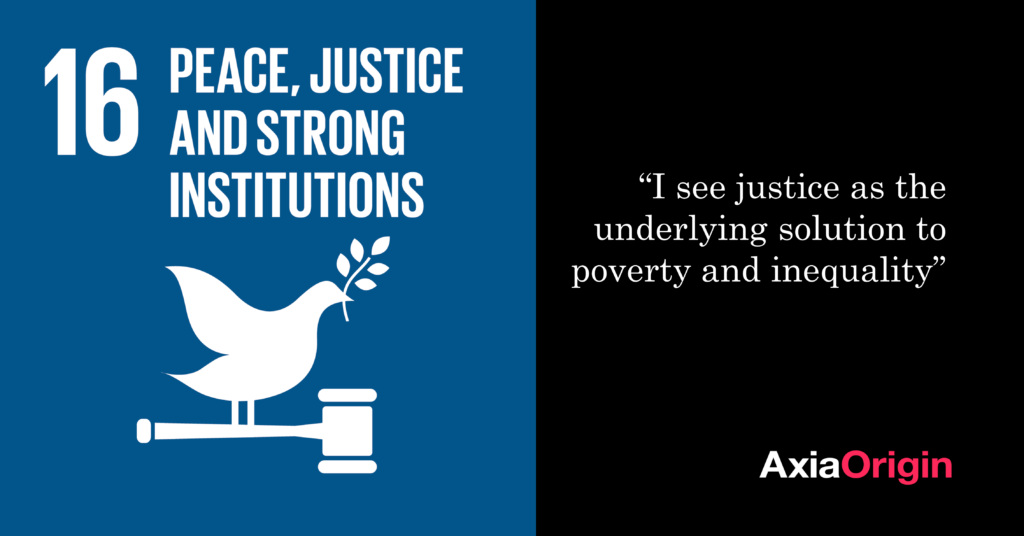This website uses cookies so that we can provide you with the best user experience possible. Cookie information is stored in your browser and performs functions such as recognising you when you return to our website and helping our team to understand which sections of the website you find most interesting and useful.
The World’s Greatest Open Innovation experiment
November 5th 2019
What does the term “justice” mean to you? And how can data and analytics play a crucial role in solving the world’s greatest challenges in the coming years? Today, we interview AxiaOrigin co-founder Hayder Allawi on the topic of SDG16: Peace, Justice and Strong Institutions, and why he considers the road to Agenda 2030 to be the world’s greatest experiment in Open Innovation.
1- Of all 17 SDGs, why is ’16 Peace, Justice and Strong Institutions’ the most important one for you?
I’ll start by saying there are many ways in which we can criticise the UN Sustainable Development Goals. Of course, the more people you share an idea with the more opinions and challenges you will face, and the UN SDGs represent a concept that has been shared with billions of people.

So in some ways this is the caveat I give when I offer my own criticism; that is to say that I don’t intend to be critical as much as to share how I feel about the SDGs, and how I believe we can use them to maximum effect even where we might have builds on or challenges to the framework.
With that in mind, I pick SDG 16 more for what it represents; I see ‘justice’ as the underlying solution to global poverty, inequality and other broader targets than how the SDGs define the term. If we have systematic elements of economic policy or the finance sector that lead to grossly inequitable distribution of wealth and resources, that is an injustice in how I define the term. In some ways, such root cause and systematic causes of financial, social and economic inequity and oppression are simultaneously the most important problems, and perhaps the most difficult to tackle.
Though the SDGs perhaps don’t go deeply enough into exploring these problems and how we might solve them, I still believe they are a powerful articulation of the essence of what resonates with the people that are striving for a better world. They are the vehicle through which awareness can be created and action instigated, to achieve lofty aims around the environment, social, economic and political global equity.
2- And how do you feel that you can impact on the delivery of this goal – at an international, national or local level?
I believe that the achievement of the goals necessitates three elements:
- Development of solutions
- Implementation (through top-down approaches, grassroots or some combination)
- Measurement and optimisation
I see my role as sitting across these three elements, depending on the goal in question.
Specifically, I believe the role of open and social analytics and activities can aid with all three of these elements. It is crucial to understanding popular opinion on topics within a particular geography or country – this allows us to identify opportunities to help collaboratively create and effectively implement solutions, and use popular sentiment to support and create momentum behind particular efforts. This is one of the activities we are pursuing with our research within AxiaOrigin. Certain solutions to problems might also be created through dispersing innovation efforts, with Open Innovation techniques – the SDGs are essentially the ultimate Open Innovation project from the UN’s perspective, but that doesn’t mean we can’t also explore subset opportunities for OI as individuals, communities or organisations.
3- And what are you hoping to do about it first?
With the framing of the SDGs as the world’s largest effort at Open Innovation (OI), I have been considering how we can map the current activities that relate to the SDGs (whether driven by the UN or otherwise) to the principles and best practices associated with OI. The aim is to identify gaps in current approaches that can inform my own organization, AxiaOrigin, or others with similar interests to focus their efforts as effectively as possible. Would love to hear from anyone with similar thoughts and interests!
4- Have you given any thought to the challenges that you might face along the way? Tell me a little about your thoughts if you have – along with how you might overcome them.
The inherent challenge I see with approaches like the SDGs is that the ambition of the effort might be out of sync with the plausibility of implementation. Having said that, the task of articulating a global vision for a better world that is segmented into more consumable topic areas has been completed. The next task we need to complete is down to individuals and organisations that care about building a better world – they need to come together with energy, pool their resources and develop their thinking to give humanity’s best effort to bridge the gap between the ambition for creating a better world, and the practicalities of actually accomplishing such an ambitious target.
5- And finally any words of advice for anyone reading this that feels inspired by what they’ve heard you say?
Get in touch. Time is running out to 2030, and the world doesn’t have long. Let’s be bolder and work together sooner rather than later – why would we wait?
Hayder Allawi | Co-founder at AxiaOrigin

